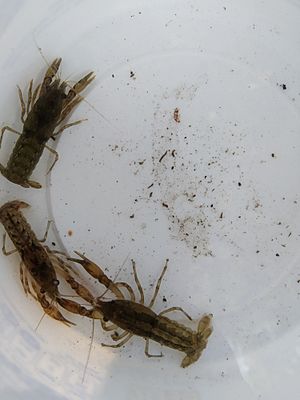Cambarellus zacapuensis facts for kids
Quick facts for kids Cambarellus zacapuensis |
|
|---|---|
 |
|
| Conservation status | |
| Scientific classification | |
| Kingdom: | |
| Phylum: | |
| Subphylum: | |
| Class: | |
| Order: | |
| Infraorder: |
Astacidea
|
| Family: |
Cambaridae
|
| Genus: |
Cambarellus
|
| Binomial name | |
| Cambarellus zacapuensis Pedraza Lara & Doadrio, 2015
|
|
The Zacapu dwarf crayfish (scientific name: Cambarellus zacapuensis) is a tiny creature that looks a bit like a mini-lobster. It's a type of crustacean, which means it's related to crabs and shrimp. You can only find this special crayfish in one place: the Angulo River basin in Mexico, especially in Zacapu Lagoon. This makes it an "endemic" species, meaning it lives only there.
What It Looks Like
The Zacapu dwarf crayfish is very similar to another type of crayfish called the Chapala acocil. These small creatures have a body that is colored, and their eyes work well.
- Size: Male Zacapu dwarf crayfish are about 26 millimeters (just over an inch) long. Females are a bit bigger, around 32 millimeters (about 1.25 inches) long.
- Cephalothorax: This is the part of their body where the head and chest are joined. In males, it's about 12 mm long and 5.5 mm wide. In females, it's about 14.5 mm long and 7 mm wide.
- Rostrum: This is a pointed part at the front of their head. It has small spines along its edges.
- Shell: Unlike some other crayfish, its shell does not have sharp spines on the neck area (cervical spine) or near the gills (branchial spine).
Where It Lives and How It's Protected
The Zacapu dwarf crayfish mainly lives in Zacapu Lagoon. It also lives in some small rivers that flow out of the lagoon, like the Angulo River. You can usually find these crayfish in shallow water. They often hide among submerged roots or on the bottom of the water.
This little crayfish is facing some big problems:
- Invasive Species: Other fish, like the common carp and grass carp, have been brought into their habitat. These "invasive species" can harm the dwarf crayfish. They might eat the crayfish or compete for their food. This has caused problems for other types of dwarf crayfish in different places.
- Water Use: People are using a lot of water from the crayfish's home. This can reduce the amount of water available for the crayfish.
Because of these threats, the Zacapu dwarf crayfish is considered an "endangered" species by the International Union for Conservation of Nature (IUCN). This means it is at a high risk of becoming extinct in the wild if we don't protect it.
See also
 In Spanish: Acocil de Zacapu para niños
In Spanish: Acocil de Zacapu para niños
 | Frances Mary Albrier |
 | Whitney Young |
 | Muhammad Ali |


